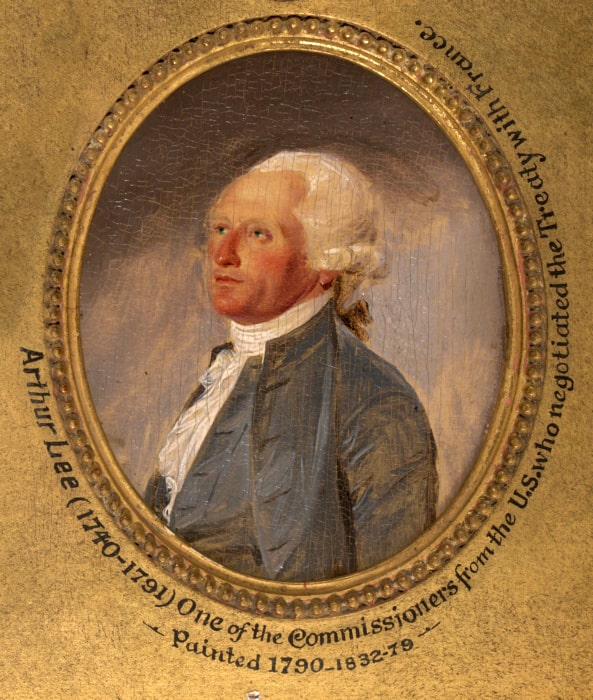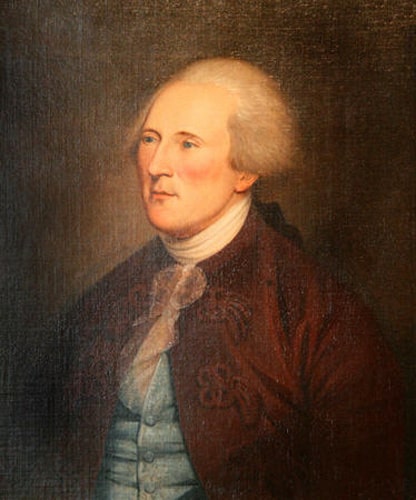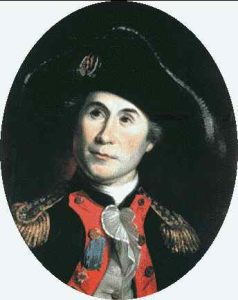Contents

Contents
Quick facts
- Born: 20 December 1740 at Stratford Hall Plantation in Westmoreland County, Virginia.
- Arthur Lee, son of Thomas Lee (1690 – 1750) and Hannah Harrison Ludwell (1701 – 50), was born into one of the most politically powerful families in Virginia. Three of his other (four) brothers also played significant roles in American Revolution:
- Richard Henry Lee
- Francis Lightfoot Lee
- William Lee
- Lee was an American diplomat and politician, known for his role in securing French support for the American Revolution.
- He served as a commissioner to France alongside Benjamin Franklin and Silas Deane, working to negotiate critical military and financial aid for the Continental Army.
- Lee was also involved in diplomatic missions in Spain and Germany, seeking European support for the American cause.
- After the war, he served as a delegate to the Continental Congress and was active in Virginia state politics.
- Died: 12 December 1792 at his plantation, Lansdowne, in Urbanna, Virginia.
- Buried in the family graveyard at Lansdowne in Urbanna, Virginia.
Biography
Arthur Lee, American diplomat, brother of Richard Henry Lee, was born at Stratford, Westmoreland county, Virginia, in 1740. He was educated at Eton, studied medicine at Edinburgh, practiced as a physician in Williamsburg, Virginia, read law at the Temple, London, in 1766 – 70, and practiced law in London in 1770 – 76. He was an intimate of John Wilkes, whom he aided in one of his London campaigns. In 1770 – 75 he served as London agent for Massachusetts, second to Benjamin Franklin, whom he succeeded in 1775.
At that time he had shown great ability as a pamphleteer, having published in London The Monitor (1768), seven essays previously printed in Virginia; The Political Detection: or the Treachery and Tyranny of Administration, both at Home and Abroad (1770), signed Junius Americanus
; and An Appeal to the Justice and Interests of the People of Great Britain in the Present Disputes with America (1774), signed An Old Member of Parliament.
In December 1775 the Committee of Secret Correspondence of Congress chose him as its European agent principally for the purpose of ascertaining the views of France, Spain, and other European countries regarding the war between the colonies and Great Britain. In October 1776 he was appointed, after the refusal of Thomas Jefferson, to the commission with Franklin and Silas Deane to negotiate a treaty of alliance, amity and commerce with France, and also to negotiate with other European governments. His letters to Congress, in which he expressed his suspicion of Deane’s business integrity and criticized his accounts, resulted in Deane’s recall; and other letters impaired the confidence of Congress in Franklin, of whom he was especially jealous. Early in 1777 he went to Spain as American commissioner, but received no official recognition, was not permitted to proceed farther than Burgos, and accomplished nothing. Until the appointment of John Jay, however, he continued to act as commissioner to Spain, held various conferences with the Spanish minister in Paris, and in January 1778 secured a promise of a loan of 3,000,000 livres, only a small part of which (some 170,000 livres) was paid.
In June 1777 he went to Berlin, where, as in Spain, he was not officially recognized. Although he had little to do with the negotiations, he signed with Franklin and Deane the Treaty of Alliance between the United States and France in February 1778. Having become unpopular at the courts of France and Spain, Lee was recalled in 1779, and returned to the United States in September 1780.

He was a member of the Virginia House of Delegates in 1781 and a delegate to the Continental Congress in 1782 – 85. With Oliver Wolcott and Richard Butler he negotiated a treaty with the Six Nations, signed at Fort Stanwix on 22 October 1784, and with George Clark and Richard Butler a treaty with the Wyandot, Delaware, Chippewa and Ottawa Indians, signed at Ft. McIntosh on 21 January 1785. He was a member of the treasury board in 1784 – 89. He strongly opposed the U.S. Constitution, and after its adoption in 1789, retired to his estate at Urbana, Virginia, where he died in 1792.



